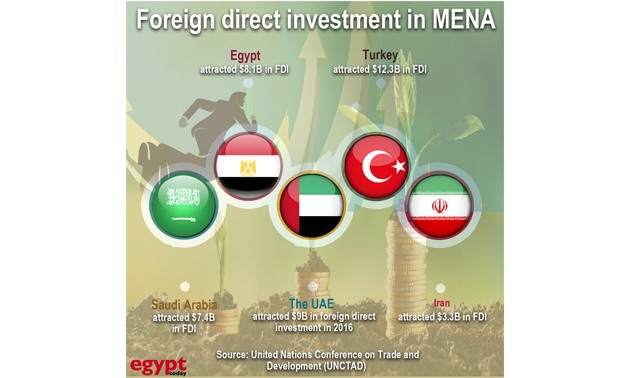
The Foreign direct investment - Egypt Today/Ahmed hussien
CAIRO – 5 July 2017: Egypt is the second biggest recipient of foreign direct investment (FDI) in the Arab world and Africa rankings 2016, standing at $8.1 billion, the UN Conference on Trade and Development (UNCTAD) said in its World Investment Report 2017 published in June.
The UAE was ranked the top FDI receipt in the Arab world at it attracted $9 billion in investment, followed by Egypt, then Saudi Arabia at $7.4 billion in FDI.
Egypt was the second largest receipt in Africa, at $8.1 billion, after Angola $14.4 billion, followed by Nigeria at $4.4 billion, Ghana at $3.5 billion and Ethiopia at $3.2 billion.
Total FDI in Africa was $59.4 billion in 2016, with a 3.5 percent decrease from 2015.
UNCTAD’s report said that international FDI flows declined 2 percent in 2016, standing at $1.75 trillion, expecting that FDI flows in 2017 and 2018 will lower than 2007 peak level.
The Egyptian government calculated total investments injected in Egypt as $7 billion, according to the annual report titled "A Year of Effective Development Cooperation," issued by Minister of Investment and International Cooperation Sahar Nasr on the eve of June 30.
Investments were said to be in projects, including expansion of road networks, establishment of new renewable power plants, and development of infrastructure and manufacturing capacities.

FDI in MENA region- Inforgraphic Ahmed Hussein
The Ministry has injected $7 billion of development funds to implement 79 development projects in 11 different sectors during 2016.
It also operated a $29 billion portfolio of official development assistance (ODA) in the last year. These projects covered major economic, social and environmental fields in accordance with the country's vision of 2030.
They included infrastructure, macroeconomic stability, financial governance, entrepreneurship, small, medium and micro enterprises, agricultural production, food security, social justice, education and tourism.

Comments
Leave a Comment